|
Dolce far niente
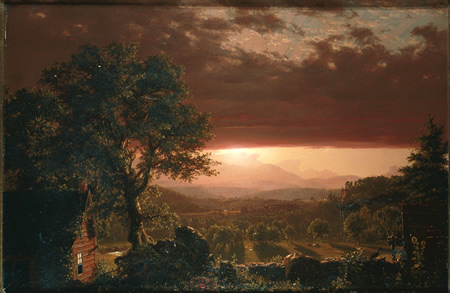
Evening After a Storm door Frederic Edwin Church, 1849
A Line-Storm Song
The line-storm clouds fly tattered and swift,
The road is forlorn all day,
Where a myriad snowy quartz stones lift,
And the hoof-prints vanish away.
The roadside flowers, too wet for the bee,
Expend their bloom in vain.
Come over the hills and far with me,
And be my love in the rain.
The birds have less to say for themselves
In the wood-world’s torn despair
Than now these numberless years the elves,
Although they are no less there:
All song of the woods is crushed like some
Wild, easily shattered rose.
Come, be my love in the wet woods; come,
Where the boughs rain when it blows.
There is the gale to urge behind
And bruit our singing down,
And the shallow waters aflutter with wind
From which to gather your gown.
What matter if we go clear to the west,
And come not through dry-shod?
For wilding brooch shall wet your breast
The rain-fresh goldenrod.
Oh, never this whelming east wind swells
But it seems like the sea’s return
To the ancient lands where it left the shells
Before the age of the fern;
And it seems like the time when after doubt
Our love came back amain.
Oh, come forth into the storm and rout
And be my love in the rain.
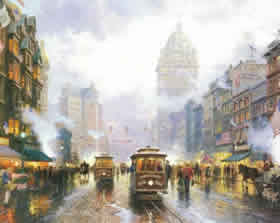
Robert Frost (26 maart 1874 – 29 januari 1963)
San Francisco, Market Street door Thomas Kinkade, z.j.
Robert Frost werd geboren in San Francisco.
De Nederlandse dichter schrijver Remco Campert werd op 28 juli 1929 in Den Haag geboren. Zie ook alle tags voor Remco Campert op dit blog.
Uit: Een liefde in Parijs
“Vergeten was geen kunst, eerder een gebrek. Of een laffe vlucht in het niets. De zucht om niets te bewaren, om steeds onbelast opnieuw te beginnen zou hem op de duur fnuiken. Als hij straks op zijn sterfbed lag en er niets meer was om naar vooruit te kijken, waar moest hij, beroofd van herinneringen, dan aan denken?
(…)
Terwijl hij zijn handen waste keek Richard naar zichzelf in de spiegel. Hij zag een vermoeide oude kop met dunne grijze krulletjes op de schedel geplakt. Dat hij jong was geweest en voor sommigen zelfs aantrekkelijk kon hij niet meer in dat door de tijd verfrommelde gezicht bespeuren.
(…)
Sinds Richard zestig was geworden schatte hij werktuiglijk de leeftijd van iedereen die hij tegenkwam. Steeds meer mensen waren jonger dan hij. Hun aantal zou alleen maar toenemen tot ze hem ten slotte met z’n allen over de rand zouden duwen.
Hij was een toegewijd lezer van rouwadvertenties geworden. Ook onder de overledenen kwamen mensen voor die jonger waren dan hij. Als hij zo’n aankondiging las kon hij een gevoel van tevredenheid niet onderdrukken. Die had hij ten minste overleefd. Maar het merendeel was van een leeftijd die nu ook voor hem in het dichtbije verschiet lag. Lang had het leven eindeloos geleken. Hij had de tijd aan een touwtje dat hij zonder de controle te verliezen onbeperkt kon vieren. Op een onbewaakt moment was hij die controle kwijtgeraakt.
De tijd had zich van hem bevrijd en raasde ongebonden alle kanten uit. Een voorval waarvan Richard dacht dat het een jaar geleden had plaatsgevonden bleek in werkelijkheid al vier of acht jaar achter hem te liggen. De rollen waren omgekeerd: de tijd speelde met hem.”
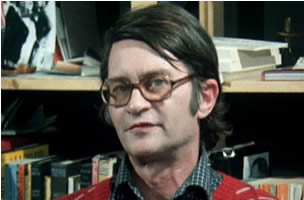
Remco Campert (Den Haag, 28 juli 1929)
In 1977
De Engelse dichter, verhalen- en romanschrijver Malcolm Lowry werd geboren 28 juli 1909 in Birkenhead Merseyside. Zie ook alle tags voor Malcolm Lowry op dit blog.
Uit: Under the Volcano
“He crossed the street, making for the station. Although he would not be travelling by train the sense of departure, of its imminence, came heavily about him again as, childishly avoiding the locked points, he picked his path over the narrow-gauge lines. Light from the setting sun glanced off the oil tanks on the grass embankment beyond. The platform slept. The tracks were vacant, the signals up. There was little to suggest that any train ever arrived at this station, let alone left it:
Yet a little less than a year ago the place had been the scene of a parting he would never forget. He had not liked the Consul's half-brother at their first encounter when he'd come with Yvonne and the Consul himself to M. Laruelle's house in the Calle Nicaragua, any more, he felt now, than Hugh had liked him. Hugh's odd appearance--though such was the overwhelming effect of meeting Yvonne again, he did not obtain even the impression of oddity so strongly that he was able later in Parián immediately to recognize him--had merely seemed to caricature the Consul's amiable half-bitter description of him. So this was the child M. Laruelle vaguely remembered hearing about years before! In half an hour he'd dismissed him as an irresponsible bore, a professional indoor Marxman, vain and self-conscious really, but affecting a romantic extroverted air. While Hugh, who for various reasons had certainly not been "prepared" by the Consul to meet M. Laruelle, doubtless saw him as an even more precious type of bore, the elderly aesthete, a confirmedly promiscuous bachelor, with a rather unctuous possessive manner towards women. But three sleepless nights later an eternity had been lived through: grief and bewilderment at an unassimilable catastrophe had drawn them together. In the hours which followed his response to Hugh's telephone call from Parián M. Laruelle learned much about Hugh: his hopes, his fears, his self-deceptions, his despairs. When Hugh left, it was as if he had lost a son.”
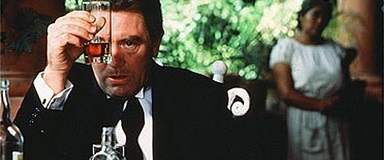
Malcolm Lowry (28 juli 1909 - 26 juni 1957)
Scene uit de film van John Huston (1984) met Albert Finney als Geoffrey Firmin
De Engelse dichter en Jezuïet Gerard Manley Hopkins werd geboren op 28 juli 1844 in Stratford, Essex. Zie ook alle tags voor Gerard Manley Hopkins op dit blog.
The Alchemist In The City
My window shews the travelling clouds,
Leaves spent, new seasons, alter'd sky,
The making and the melting crowds:
The whole world passes; I stand by.
They do not waste their meted hours,
But men and masters plan and build:
I see the crowning of their towers,
And happy promises fulfill'd.
And I - perhaps if my intent
Could count on prediluvian age,
The labours I should then have spent
Might so attain their heritage,
But now before the pot can glow
With not to be discover'd gold,
At length the bellows shall not blow,
The furnace shall at last be cold.
Yet it is now too late to heal
The incapable and cumbrous shame
Which makes me when with men I deal
More powerless than the blind or lame.
No, I should love the city less
Even than this my thankless lore;
But I desire the wilderness
Or weeded landslips of the shore.
I walk my breezy belvedere
To watch the low or levant sun,
I see the city pigeons veer,
I mark the tower swallows run
Between the tower-top and the ground
Below me in the bearing air;
Then find in the horizon-round
One spot and hunger to be there.
And then I hate the most that lore
That holds no promise of success;
Then sweetest seems the houseless shore,
Then free and kind the wilderness,
Or ancient mounds that cover bones,
Or rocks where rockdoves do repair
And trees of terebinth and stones
And silence and a gulf of air.
There on a long and squared height
After the sunset I would lie,
And pierce the yellow waxen light
With free long looking, ere I die.
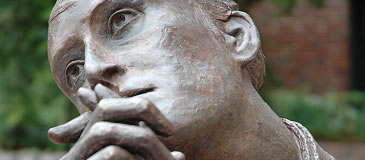
Gerard Manley Hopkins (28 juli 1844 – 8 juni 1889)
Beeld van Rowan Gillespie in Denver (detail)
Zie voor nog meer schrijvers van de 28e juli ook mijn blog van 28 juli 2013 en ook mijn blog van 28 juli 2011 deel 2.
28-07-2015 om 17:09
geschreven door Romenu 
Tags:Dolce far niente, Robert Frost, Remco Campert, Malcolm Lowry, Gerard Manley Hopkins, Romenu
|

